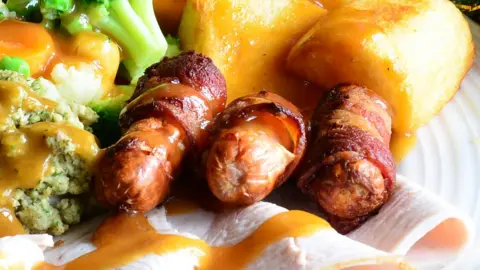Christmas meal treats 'under threat'
 Getty Images
Getty ImagesPigs in blankets and other festive meal treats might be in short supply this Christmas, the British Meat Processors Association has warned.
It says 60% of the labour force in UK meat plants comes from other countries and the industry is not attracting enough seasonal EU workers.
Its chief executive, Nick Allen, told the BBC that wrapping cocktail sausages in bacon was done by hand.
He said the job was "fiddly and hard to mechanise".
At the same time, the British Poultry Council warned that "finding sufficient labour is becoming a massive challenge for the poultry meat sector as the uncertainty around Brexit is prompting many of our workers to seek jobs in other countries".
It said that if the shortage of workers continued post-Brexit, it would "pose a risk to the affordability of British food".
Rural areas
The British Meat Processors Association said there was a difficulty in attracting UK nationals to work in meat plants, because they tended to be in rural areas where there was low unemployment.
"Ever since Brexit happened, it's become hard to hold on to European labour," Mr Allen said.
The sharp fall in the value of the pound had amounted to a reduction in wages for them, he added, while "the message coming out of the UK is not exactly welcoming".
But he added: "It's not just a Brexit issue." The working conditions in meat plants, including the low temperatures need to preserve the meat, made it hard to attract workers, while demand for seasonal labour was naturally higher in other sectors too, especially delivering Christmas cards and parcels.
Economic mainstay
The British Meat Processors Association represents the majority of companies working in the British meat industry, handling beef, lamb and pork products.
Its members are responsible for supplying fresh meat and meat products to retailers, restaurants and food service companies throughout the UK.
The industry employs about 75,000 people and is worth more than £7bn a year to the British economy.
Meanwhile, the UK poultry industry employs more than 37,000 people and contributes more than £3bn a year to the economy.
A spokesperson for the British Poultry Council said the industry had grown "beyond the UK labour availability in the areas we operate".
This meant that it needed to find 7,200 non-UK workers every year to fill its vacancies.
The spokesperson added: "If these vacancies cannot be filled post-Brexit, we will not have access to the labour needed to feed this nation, which will have a significant impact on the production of, and therefore cost of food.
"This in turn would pose a risk to the affordability of British food."
